
A federal grant will help four of Ohio’s largest cities collaborate on new voluntary building performance standards and a resource hub to help commercial building owners save energy and cut emissions.
Cincinnati, Cleveland, Columbus, and Dayton will use $10 million in Inflation Reduction Act funding to establish the Ohio High Performance Building Hub, which will connect building owners with technical guidance, financing solutions, incentives, training, and other support.
Clean energy advocates and city sustainability leaders hope the program will offer a new path forward in a state where buildings account for about one-fourth of greenhouse gas emissions but state lawmakers have gutted mandatory energy efficiency measures. The state ranked 44th in a recent state energy efficiency policy report card.
“All four of those cities have ambitious climate goals, and addressing existing buildings is a crucial part of that,” said Nat Ziegler, a program manager with Power a Clean Future Ohio, which is a partner on the grant. They expect lessons learned from the work and the hub can eventually help other cities and towns in Ohio and across the Midwest.
Buildings account for a significant share of greenhouse gas emissions in the four cities participating in the grant: greater than 60% for Cincinnati and from 50% to 55% for Cleveland, Columbus and Dayton. The new program will specifically target emissions from more than 421 million square feet of commercial building space among the four cities.
“This is a great way to really jump-start a lot of that work,” said Erin Beck, assistant director for Sustainable Columbus.
The hub could help building owners navigate funding under the Inflation Reduction Act, as well as through bonds issued by the Ohio Air Quality Development Agency or local port authorities or lending from green banks or more traditional financial institutions.
Existing building energy codes “apply primarily to new construction and major renovations, which is great. But most buildings already exist, right?” said Amanda Webb, an assistant professor of architectural engineering at the University of Cincinnati, which was the lead recipient of an earlier $2.9 million grant focused on developing technical guidance for the voluntary standards.
Work under both Department of Energy grants focuses on “coming up with a way to help really deliver the benefits of energy efficiency to existing buildings at scale,” Webb said.
The standards will differ from more general guidelines such as the U.S. Green Building Council’s LEED program, which largely emphasize new construction and a broader range of sustainability measures than energy use and emissions.
Cities will use the technical guidance from the work by Webb’s group and results from outreach to develop standards, rather than codes. The difference is codes are mandatory, with penalties for violations, whereas standards are not.
“The approach that we’re taking with this is definitely much more of a carrot approach” than a stick, said Robert McCracken, who heads up energy management for the Office of Environment & Sustainability in Cincinnati, which is the lead partner on the project.
The reasons are largely legal, as well as political. Over the past decade, leadership in the Ohio General Assembly has generally opposed imposing requirements to cut pollution, and a bill for utilities to provide voluntary energy efficiency programs still has not passed.
As a legal matter, cities generally can’t adopt building codes stricter than those established by the Ohio Board of Building Standards. However, the board doesn’t have authority to set requirements for benchmarking emissions or performance standards for existing buildings. The cities’ grant application said the board confirmed that a delegation of authority won’t be needed, as long as they don’t adopt new construction codes.
Energy efficiency provides its own incentives for building owners, because “it saves money,” said Oliver Kroner, who heads up Cincinnati’s Office of Environment & Sustainability. “People are generally aligned with the [city’s] climate commitments. But there’s sometimes the gap with what you want to do and how to get there.”
Lower costs for building owners can also let them charge lower rents, which can attract tenants. “We frequently receive inquiries from companies who are considering relocating, and they’re interested in the climate effort here,” Kroner said.
Ziegler said many of their organization’s 50 local government members also have shown interest in getting help for cutting building emissions. The independent hub to be set up under the new grant will really help building owners with the “nuts and bolts” for meeting their city’s building performance standards, they said.
Columbus is the only one of the four cities with a benchmarking policy right now, and the plan calls for the others to adopt their own versions as well. Benchmarking will be key for letting the cities track progress in reducing energy use. Based on existing commercial building stock in each city, the team members estimate cutting energy use 45% by 2050, the grant application materials said.
Beck said the Columbus benchmarking program has “been very successful,” noting the city has worked with building owners to help them comply. Audits done as part of the process have also identified “low hanging fruit” for adding energy efficiency through LED lighting, thermostat adjustments and so on, she noted.
Equity concerns also factor into the choice of standards versus codes. Businesses in historically disinvested communities already face a variety of financial and other challenges.
“We want this to be a benefit rather than yet another burden that’s imposed on them,” Ziegler said.
Webb’s team is also exploring how building performance standards could be tailored up front to address concerns about affordability. Possibilities could include a metric to reflect greater equity needs or measures to ensure tenants as well as owners benefit from savings.
“We have other grants that are focused on workforce development,” Kroner said, adding his hope that many people from underserved communities will be able to work in jobs to help buildings meet building performance standards once they’re adopted.
As work by Webb’s group continues, the four cities and others will gear up for outreach efforts and other work so they’re ready to adopt standards. “There’s going to be a lot of education and outreach in the beginning,” McCracken said.

A year and a half since Massachusetts introduced an optional new building code aimed at lowering fossil fuel use, climate activists are heartened by how quickly cities and towns are adopting the new guidelines.
The new code, known as the specialized stretch code, became law in 2023. Since then, 45 municipalities representing about 30% of the state’s population have voted to adopt its guidelines. The code is already active in 33 of these communities and scheduled to take effect over the next year in another 12.
“That is just an astounding statistic to me,” said climate advocate Lisa Cunningham, one of the founders of decarbonization nonprofit ZeroCarbonMA. “The rollout has been, quite frankly, amazing.”
Massachusetts has long been a leader in using opt-in building codes to push for decarbonization of the built environment. In 2009, the state introduced the country’s first stretch code, an alternative version of the building code that includes more stringent energy efficiency requirements. Municipalities must vote to adopt the stretch code, and the vast majority have done so: As of June, just 8.5% of residents lived in the 50 towns and cities without a stretch code.
The specialized stretch code takes this approach a step farther. The goal is to create a code that will help achieve target emissions reductions from 2025 to 2050, when the state aims to be carbon-neutral. In 2021, the legislature called on the state to create an additional opt-in code that would get close to requiring net-zero carbon emissions from new construction.
“We want to work towards decarbonizing those buildings, right from the start, as we look to a future in 2050 while we are net-zero in greenhouse gas emissions,” said Elizabeth Mahony, commissioner of the Massachusetts Department of Energy Resources.
At the same time, electrified, energy-efficient homes will mean lower energy costs for residents over time, more comfortable and healthier indoor air, and more stable indoor temperatures when power outages occur, she said.
The construction industry, meanwhile, has concerns about the measure’s impact on upfront costs.
The resulting code doesn’t require buildings to achieve net-zero emissions right away, but attempts to ensure any new construction will be ready to go carbon-neutral before 2050.
There are a few pathways for compliance. A newly built home can use fossil fuels for space heating, water heating, cooking, or drying or be built fully electrified. If the new home uses any fossil fuels, however, it must be built to a higher energy efficiency standard, be wired to ready the house for future electrification, and include solar panels onsite where feasible. In all cases, homes must be wired for at least one electric vehicle charging station.
Larger, multifamily buildings must be built to Passive House standards, a certification that requires the dramatic reduction of energy use as compared to similar buildings of the same size and type. Single-family homes can also choose to pursue Passive House certification.
Decarbonization advocates are pleased with the rollout so far. The state’s major cities, including Boston, Worcester, and Cambridge, were all quick to adopt the code. In most municipalities the vote to adopt the specialized code has been near-unanimous, said Cunningham.
And more communities are considering the specialized code.
“We’re talking to a lot of communities that are contemplating it for their town meetings this fall,” Mahony said. “We know there is a growing sense out there of wanting to do this.”
The key to convincing cities and towns that the code is a good idea is for municipal governments to understand and frame the code as a consumer protection measure, rather than an added burden, Cunningham said. The requirements of the specialized code along with state and federal incentives can save on construction costs upfront, and will ensure buildings cost less to operate during their lifetime, offering significant benefits to residents, she said.
“At the point of construction this is an incremental expense – it’s barely even a blip,” she said. “Then it directly reduces your future electricity bills.”
Many in the construction industry, however, disagree with Cunningham’s take. Emerson Clauss III, a director with the Home Builders and Remodelers Association of Massachusetts, has found the equipment needed to reach the high standards in the code is more expensive than its authors counted on, and supply chain issues are causing even higher prices.
“It’s had quite a rough start to it,” Clauss said. “It’s adding considerable cost to new housing.”
He also worries that the high cost of electricity now — Massachusetts electricity prices are the third highest in the country — spells near-term financial trouble for homeowners that feel forced to go all-electric.
“The idea that it’s going to cost less 20 years from now — what does that do for people who need to get into a house now?” he asked.
Furthermore, the creation of a new optional code, he said, adds another variable for builders already jumping between the basic code and the previous stretch code, as well as learning the new rules in ten communities banning fossil fuels as part of a state pilot program. Even municipal building directors aren’t able to keep up, Clauss said, recalling a confused call with a suburban building inspector who needed 20 minutes to confirm it was OK to install a natural gas line in a new home.
In Cambridge, one of the first cities to adopt the specialized code, Assistant Commissioner of Inspectional Services Jacob Lazzara noted there was some confusion at the outset, but time and proactive communication from the city helped ease the transition. The city has held trainings, created materials to hand out to builders and design professionals, and fine-tuned internal communications to make sure the staff is all well informed.
“There was a little bit of shock for everyone at first, but I think we’re in a good place right now,” Lazzara said.

As low-income households face the dual burden of weather extremes and high energy costs, energy efficiency is an increasingly important strategy for both climate mitigation and lower utility bills.
Passive House standards — which create a building envelope so tight that central heating and cooling systems may not be needed at all — promise to dramatically slash energy costs, and are starting to appear in “stretch codes” for buildings, including in Massachusetts, Illinois, Washington and New York.
And while some builders are balking at the initial up-front cost, other developers are embracing passive house metrics as a solution for affordable multifamily housing.
“We’re trying to make zero energy, high performing buildings that are healthy and low energy mainstream everywhere,” said Katrin Klingenberg, co-founder and executive director of Passive House Institute-U.S., or Phius.
Klingenberg says the additional work needed to meet an aggressive efficiency standard, is, in the long run, not that expensive. Constructing a building to passive standards is initially only about 3%-5% more expensive than building a conventional single family home, or 0%-3% more for multifamily construction, according to Phius.
“This is not rocket science… We’re just beefing up the envelope. We’re doing all the good building science, we’re doing all the healthy stuff. We’re downsizing the [heating and cooling] system, and now we need someone to optimize that process,” Klingenberg said.
A Phius-certified building does not employ a conventional central heating and cooling system. Instead, it depends on an air-tight building envelope, highly efficient ventilation and strategically positioned, high-performance windows to exploit solar gain during both winter and summer and maximize indoor comfort.
The tight envelope for Phius buildings regulates indoor air temperature, which can be a literal lifesaver when power outages occur during extreme heat waves or cold snaps, said Doug Farr, founder and principal of architecture firm Farr Associates.
Farr pointed to the example of the Academy for Global Citizenship in Chicago, which was built to Phius standards.
“There was a really cold snap in January. Somehow the power went out [and the building] was without electricity for two or three days. And the internal temperature in the building dropped two degrees over three days.”
Farr said that example shows a clear benefit to high efficiency that justifies the cost.
“You talk about the ultimate resilience where you’re not going to die in a power outage either in the summer or the winter. You know, that’s pretty valuable.”
There is also a business case to be made for implementing Phius and other sustainability metrics into residential construction, such as lowered bills that can appeal to market-rate buyers and renters, and reduced long-term maintenance costs for building owners.
AJ Patton, founder and CEO of 548 Enterprise in Chicago, says in response to questions about how to convince developers to consider factors beyond the bottom line, simply, “they shouldn’t.”
Instead, he touts lower operating costs for energy-efficiency metrics rather than climate mitigation when he pitches his projects to his colleagues.
“I can’t sell people on climate change anymore,” he said. “If you don’t believe by now, the good Lord will catch you when He catch you.
“But if I can sell you on lowering your operating expenses, if I can sell you on the marketability, on the fact that your tenants will have 30%, 40% lower individual expenses, that’s a marketing angle from a developer owner, that’s what I push on my contemporaries,” Patton said. “And then that’s when they say, ‘if you’re telling the truth, and if your construction costs are not more significant than mine, then I’m sold.’”
Phius principles can require specialized materials and building practices, Klingenberg said. But practitioners are working toward finding ways to manage costs by sourcing domestically available materials rather than relying on imports.
“The more experienced an architect [or developer] gets, they understand that they can replace these specialized components with more generic materials and you can get the same effect,” Klingenberg said.
Patton is presently incorporating Phius principles as the lead developer for 3831 W Chicago Avenue, a mixed use development located on Chicago’s West Side. The project, billed as the largest passive house design project in the city to date, will cover an entire city block, incorporating approximately 60 mixed-income residential units and 9,000 sq ft of commercial and community space.
Another project, Sendero Verde, located in the East Harlem neighborhood of New York City, is the largest certified passive-house building in the United States with 709 units. Completed in April, Sendero Verde is designed to provide cool conditions in the summer and warmth during the winter — a vast improvement for the low-income and formerly unhoused individuals and families who live there.
Even without large upfront building cost premiums and with the increased impact of economies of scale, improved technology and materials, many developers still feel constrained to cut costs, Farr said.
“There’s entire segments of the development spectrum in housing, even in multifamily housing in Chicago, where if you’re a developer of rental housing time and again … they feel like they have no choice but to keep things as the construction as cheap as possible because their competitors all do. And then, some architecture firms only work with those ‘powerless’ developers and they get code-compliant buildings.”
But subsidies, such as federal low income housing credits, IRS tax breaks and resources from the Department of Energy also provide a means for developers to square the circle, especially for projects aimed toward very low-income residents.
Nonetheless, making the numbers work often requires taking a long-term view of development, according to Brian Nowak, principal at Sweetgrass Design Studio in Minnesota. Nowak was the designer for Hillcrest Village, an affordable housing development in Northfield that does not utilize Phius building metrics, but does incorporate net-zero energy usage standards.
“It’s an investment over time, to build resilient, energy-efficient housing,” he told the Energy News Network in June 2023.
“That should be everyone’s goal. And if we don’t, for example, it affects our school system. It affects the employers at Northfield having people that are readily available to come in and fill the jobs that are needed.
“That’s a significant long-term benefit of a project like this. And that is not just your monthly rents on the building; it’s the cost of the utilities as well. When those utilities include your electricity and your heating and cooling that’s a really big deal.”
Developers like Patton are determined to incorporate sustainability metrics into affordable housing and commercial developments both because it’s good business and because it’s the right thing to do.
“I’m not going to solve every issue. I’m going to focus on clean air, clean water, and lowering people’s utility bills. That’s my focus. I’m not going to design the greatest architectural building. I’m not even interested in hiring those type of architects.
“I had a lived experience of having my heat cut off in the middle of winter. I don’t want that to ever happen to anybody I know ever again,” Patton said. “So if I can lower somebody’s cost of living, that’s my sole focus. And there’s been a boatload of buy-in from that, because those are historically [not] things [present] in the communities I invest in.”
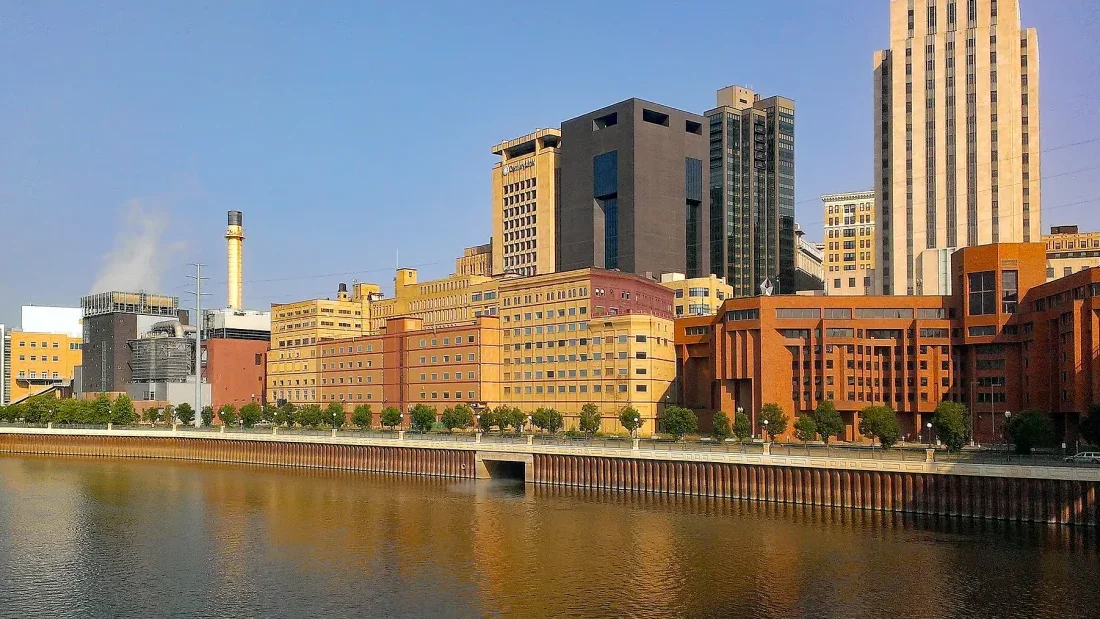
BUILDINGS: A New York start-up focused on decarbonizing big buildings from the outside with insulated, HVAC-integrated panels wins a $250,000 funding prize from a state tech competition; it plans to pilot the tech at a public housing complex. (Canary Media)
ALSO: A New York City public housing complex completed in April is the nation’s largest certified passive-house building and is serving as a model for future development elsewhere. (The Guardian/The City)
GRID:
FOSSIL FUELS: As federal investigators look to understand the cause of a gas leak and subsequent explosion at a Bel Air, Maryland, house, a reporter highlights how previous explosions have informed utility policy. (Baltimore Sun)
POLITICS: Plenty of Inflation Reduction Act funds are being spent in Pennsylvania, a political swing state, but it’s yet to be seen whether voters know where the money is coming from and if it will benefit Democrats in the presidential election. (Politico)
WORKFORCE: Demand for heat pump installation and repair in Maine is exceeding the capacity of technician training programs. (Portland Press Herald)
SOLAR:
TRANSIT: Some senior advocates say Maine housing policy needs a revamp to encourage senior housing to be built near public transit lines. (Bangor Daily News)
COMMENTARY:

Construction is underway in St. Paul, Minnesota, on a major affordable housing development that will combine solar, geothermal and all-electric appliances to create one of the region’s largest net-zero communities.
Twin Cities Habitat for Humanity broke ground in June on a four-block, 147-unit project on the site of a former golf course that’s being redeveloped by the city and its port authority, which made the decision to forgo gas hookups.
Affordable housing and Habitat for Humanity builds in particular have become a front line in the fight over the future of gas. The organization has faced criticism in other communities for accepting fossil fuel industry money and partnering with utilities on “net-zero” homes that include gas appliances. It’s also built several all-electric projects using advanced sustainable construction methods and materials.
The scale of the Twin Cities project is what makes it exciting, according to St. Paul’s chief resilience officer Russ Stark.
“We’ve had plenty of motivated folks build their own all-electric homes, but they’re one-offs,” he said. “There haven’t been many, if any, at scale.”
Stark added that the project, known as The Heights, was made possible by the federal Inflation Reduction Act.
“I think it’s fair to say that those pieces couldn’t have all come together without either a much bigger public investment or the Inflation Reduction Act, which ended up being that big public investment,” he said.
Port Authority President and CEO Todd Hurley said his organization bought the property in 2019 from the Steamfitters Pipefitters Local 455, which maintained it as a golf course until 2017. When no private buyers expressed interest in the property, the Port Authority bought it for $10 million.
Hurley said the Port Authority saw potential for light industrial development and had the experience necessary to deal with mercury pollution from a fungicide the golf course staff sprayed to kill weeds.
“We are a land developer, a brownfield land developer, and one of our missions is to add jobs and tax base around the creation of light industrial jobs,” Hurley said.
The Port Authority worked with the city’s planning department on a master plan that included housing, and it solicited developers to build a mix of market-rate, affordable and low-income units. The housing parcels were eventually sold for $20 million to a private developer, Sherman Associates, which partnered with Habitat and JO Companies, a Black-owned affordable and multi-family housing developer.
“Early on, we identified a very high goal of (becoming) a net zero community,” Hurley said. “Everything we have been working on has been steering towards getting to net zero.”
Twin Cities Habitat President and former St. Paul mayor Chris Coleman said the project met his organization’s strategic plan, which calls for building bigger developments instead of its traditional practice of infilling smaller lots with single-family homes and duplexes. The project will be the largest the organization has ever built in the Twin Cities.
Coleman said the Heights offered an opportunity to fill a need in one of St. Paul’s most diverse and economically challenged neighborhoods and “be part of the biggest investment in the East Side in over 100 years.”
The requirement for all-electric homes merged with Habitat’s goal of constructing more efficient and sustainable homes to drive down utility costs for homeowners, he said. Habitat built solar-ready homes and sees the solar shingles on its homes in The Heights as a potential avenue to producing onsite clean energy.
Mike Robertson, a Habitat program manager working on the project, said the organization worked with teams from the Minneapolis-based Center for Energy and Environment on energy modeling.
“The Heights is the first time that we’ve dived into doing an all-electric at scale,” Roberston said. “We have confidence that these houses will perform how they were modeled.”
Habitat plans to build the development to meet the Zero Energy Ready Home Program standards developed by the U.S. Department of Energy. Habitat will use Xcel Energy’s utility rebate and efficiency programs to achieve the highest efficiency and go above and beyond Habitat’s typical home standards.
The improved construction only adds a few thousand dollars to the overall costs and unlocks federal government incentives to help pay for upgrades, he said.
The nonprofit will receive free or reduced-cost products from Andersen Windows & Doors and other manufacturers. GAF Energy LLC, a solar roofing company, will donate solar shingles for over 40 homes and roofing materials. On-site solar will help bring down energy bills for homeowners, he said.
Chad Dipman, Habitat land development director, said the solar shingles should cover between half and 60% of the electricity the homes need. Habitat plans to use Xcel Energy incentive programs to help pay for additional solar shingles needed beyond those donated.
Habitat will install electric resistance heating technology into air handlers to serve as backup heat for extremely cold days. Dipman said that the air source heat pumps will also provide air conditioning, a feature not available in most Habitat properties in Minnesota.
Phil Anderson, new homes manager at the Center for Energy and Environment, has worked with Habitat on the project. He said the key to reducing the cost of heating and cooling electric homes is a well-insulated, tight envelope and high-performance windows. Habitat will build on its experience with constructing tight homes over the past decade, he said.
“Overall, the houses that we’ve been part of over the last almost ten years have been very tight homes,” Anderson said. “There’s just not a lot of air escaping.”
Habitat’s national office selected The Heights as this year’s Jimmy & Rosalynn Carter Work Project, named after the former president and his wife, two of Habitat’s most famous supporters. The work project begins September 29th and will receive as visitors Garth Brooks and Trisha Yearwood, who now host the Carters’ program.
Robertson said thousands of volunteers from around the country and the world will help put up the homes. The Heights project “raises a lot of awareness for Habitat and specifically for this development and the decarbonization efforts that we’re putting into it,” he said.
The Heights’s two other housing developers continue raising capital for their projects and hope to break ground by next summer. Habitat believes the project will meet its 2030 completion deadline.
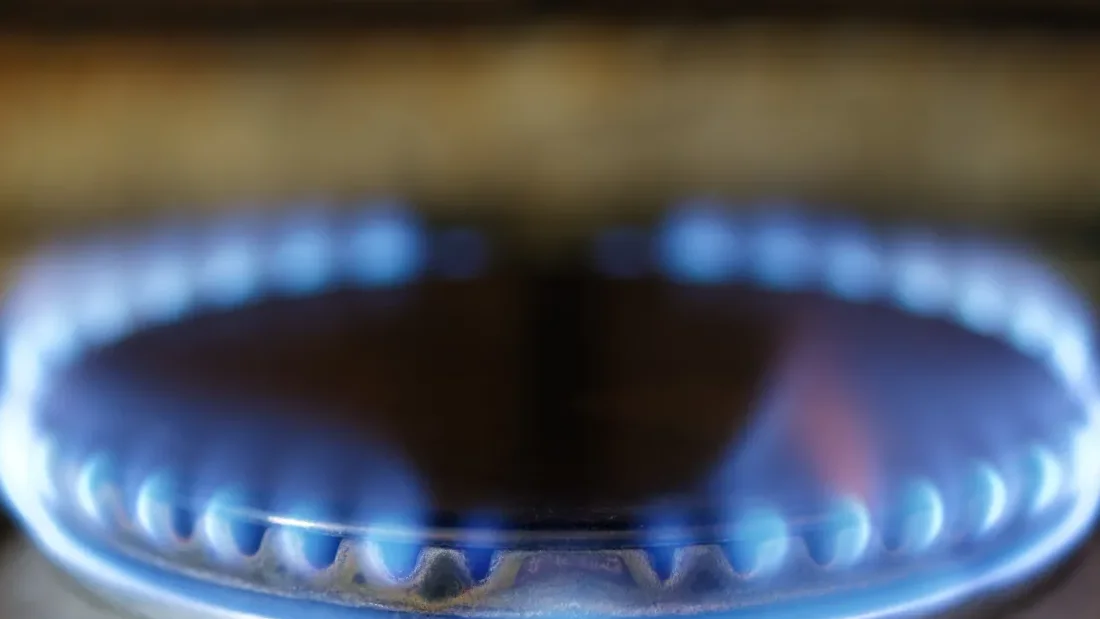
Snaking under city streets, behind residential drywall and into furnaces, ovens and other appliances, natural gas pipelines are a ubiquitous presence in U.S. buildings. The question of what to do with them as the planet warms has become a serious debate — dozens of U.S. cities and states have crafted plans to reduce reliance on natural gas, and more than 20 other states have passed laws to preempt that type of regulation.
Now, utilities around the nation have begun testing a controversial idea aimed at reducing the carbon footprint of gas lines, while keeping them in place. Nearly 20 utilities have laid out plans to inject lines with a blend of gas and hydrogen, the latter of which emits no carbon dioxide (CO2) — a major greenhouse gas — when combusted. Testing such blends, these companies say, is an essential step towards understanding the practice, which they argue will help reduce emissions and fight climate change.
Deploying more hydrogen is also a federal priority — the Inflation Reduction Act created a tax credit for hydrogen production, and the Bipartisan Infrastructure Law set aside $9.5 billion to support hydrogen development.
But a federal hydrogen strategy released last year suggests blending hydrogen into gas infrastructure should focus on industrial applications. Many environmental and customer advocates agree; they argue that the use of hydrogen blends in buildings — rather than to power industries that are hard to electrify — makes little sense.
“Every dollar you’re reinvesting into the gas system could be a dollar you’re using to electrify the system,” said Nat Skinner, program manager of the safety branch of the California Public Advocates Office, an independent state office that advocates for consumers in utility regulation. “Finding the right uses for hydrogen is appropriate. But I think being really careful and thoughtful about how we’re doing that is equally important.”
Nearly 30 projects focused on blending hydrogen into gas lines that serve homes and businesses have been proposed or are in operation in more than a dozen states, Floodlight found, and many more utilities have hinted at future proposals. If all are approved, the projects as proposed would cost at least $280 million — and many utilities are asking that customers pay for them.
As regulators consider the proposals, advocates are calling for them to weigh the prudence of the investment. In California — where electric rates have climbed steeply in recent years — the Sierra Club has argued that the projects are “an inappropriate use of ratepayer funds” and “wasteful experiments.”
Hydrogen blending can be undertaken in a section of pipeline isolated from the rest of the gas network or in a larger “open” system that serves homes. Utilities can inject it in large transmission lines, which ferry gas from processing and storage locations to compressor stations, or into distribution lines, the smaller pipes that bring gas to buildings.
Because hydrogen releases only water vapor and heat when it’s burned, it’s considered a clean fuel. And unlike traditional wind and solar energy, it can produce enough heat to run industrial furnaces. Utilities have framed the fuel as a clear way to slash the emissions associated with their operations.
“These demonstration projects are an important step for us to adopt hydrogen blending statewide, which has the potential to be an effective way to replace fossil fuels,” said Neil Navin, the chief clean fuels officer at Southern California Gas (SoCalGas), in a March statement on its application for hydrogen blending pilots.
Burning hydrogen, particularly in homes, also presents certain risks. Hydrogen burns hotter than natural gas, which can increase emissions of nitrous oxide (NOx), a harmful air pollutant that can react with other elements in the air to produce damaging pollutants including small particulates and ozone.
Hydrogen is a smaller molecule than methane, the main ingredient in natural gas, and can leak more readily out of pipelines. Hydrogen is also flammable. And when certain metals absorb hydrogen atoms, they can become brittle over time, creating risks of pipeline cracks, depending on the materials the pipelines are made of.
There are also outstanding questions about how much hydrogen blending actually reduces greenhouse gas emissions.
Of the utilities that have offered details about the hydrogen source they plan to use for their pilot, roughly half plan to use “green hydrogen,” which is produced using clean electricity generated by renewable sources such as wind and solar. Today, fossil fuels power more than 90% of global hydrogen production, producing “gray hydrogen.”
Most utility blending pilots are targeting blends of up to 20% hydrogen. At those levels, research has shown that hydrogen would reduce carbon dioxide emissions by less than 10%, even when using hydrogen produced with clean manufacturing processes.
Some utilities have estimated the emissions impacts of their pilots. A CenterPoint Energy pilot in Minneapolis using blends of up to 5% green hydrogen was estimated to reduce carbon emissions by 1,200 metric tons per year, which is the approximate energy use of 156 homes. A project in New Jersey testing blends of 1% green hydrogen was estimated to reduce emissions enough to offset the energy use of roughly 24 homes.
Blending gray hydrogen may show no carbon benefit at all, according to some research. That’s in part because hydrogen produces one-third less energy by volume than natural gas, meaning three times the amount of hydrogen is needed to make up for the same unit of natural gas.
And hydrogen requires more energy to manufacture than it will later produce when it’s burned. For these reasons, some environmental groups say hydrogen is an inefficient way to decarbonize homes and businesses; some analysts have called the process “a crime against thermodynamics.”
“There are much better, readily available, more affordable ways to decarbonize buildings in the form of electrification and energy efficiency,” said Jim Dennison, a staff attorney at the Sierra Club.
Advocates including Dennison also worry that investing more in the natural gas system will delay electrification and allow utilities to keep their core pipeline businesses running. “I can see why that’s attractive to those utilities,” he said. “That doesn’t mean it makes sense for customers or the climate.”
While the climate benefits are debated, some research and active projects indicate that burning blended fuel at certain levels can be safe. For decades, Hawaii Gas has used synthetic natural gas that contains 10-12% hydrogen. Countries including Chile, Australia, Portugal and Canada have also run hydrogen blending pilots.
And although pipelines can weather when carrying hydrogen, that’s less likely for distribution lines that reach homes because those pipes are often plastic, said Bri-Mathias Hodge, an associate professor in energy engineering at the University of Colorado-Boulder.
Hodge helped author a 2022 review of technical and regulatory limits on hydrogen and gas blending. With blends below 5%, Hodge said customers are unlikely to face risks or notice a difference in how their appliances or furnaces function.
More uncertainty exists around higher blends. “I think we’re not sure if below 20% or say, from 5 to 20% is safe,” said Ali Mosleh, an engineer at the University of California-Los Angeles who is spearheading hydrogen blend pilot testing with 44 partners, including utilities, to address knowledge gaps in the state.
Although Hodge at UC-Boulder thinks electrification is the more efficient choice for homes, he said the pilots can help utilities get comfortable with blending, which may eventually be applied elsewhere. “It’s not going to really move the needle in terms of decarbonization long term, but it’s a step in the right direction,” he said.
Steven Schueneman, the hydrogen development manager at utility Puget Sound Energy, which serves about 1.2 million electric and 900,000 gas customers in Washington, said incremental approaches like utility blending pilots will signal that hydrogen is a “real industry.” That could help the fuel gain a foothold in other areas, like industrial heat and aviation.
But Schueneman also acknowledges there remains uncertainty around whether hydrogen is the most cost-effective way to decarbonize buildings.
“It’s not clear that blending hydrogen is going to be a prudent decision at the end of the day,” he said.
Puget Sound Energy has conducted two small-scale blending pilots at a test facility. In the future, the utility plans to focus its hydrogen efforts on how blends may function in power plants, rather than in buildings. The nearly 30 blending pilots Floodlight tracked include only projects focused on use in buildings, but other utilities have proposed blending hydrogen at natural gas power plants, where the blend will be burned for electricity.
Blending pilots focused on buildings have been spearheaded by some of the largest utilities in the nation as well as smaller-scale gas providers, and are being considered from coast-to-coast.
Dominion Energy, which serves 4.5 million customers in 13 states, has laid out plans for three blending pilots, in Utah, South Carolina and Ohio. National Grid, which has 20 million customers, is pursuing a project in New York. And multiple large California utilities have proposed pilot programs.
Some utilities, such as Dominion and Minnesota-based Xcel Energy, did not reply to several requests for clarification on hydrogen blending plans, or replied to only some queries about their plans. But plans from certain utilities have been detailed in regulatory filings with state utility commissions.
The pilots for which cost data are available range in price from roughly $33,000 for Puget Sound Energy’s small-scale testing (which ratepayers did not fund) up to an estimated $63.5 million for a decade-long pilot proposed by California utility Pacific Gas & Electric (PG&E), which would focus on blending 5% at the start ranging up to 20% hydrogen in transmission gas lines.
If approved, customers would pay up to $94.2 million for PG&E’s pilot, because of the rate of return utilities are able to collect from customers. California utilities are aiming to recover more than $200 million in total from customers for their proposed pilots.
California regulators have rejected some previous blending proposals from utilities, saying companies should use “every reasonable attempt to use existing and other funds before requesting new funds.” Advocates including the Environmental Defense Fund (EDF) have argued that the projects are not in the public interest, particularly amid the state’s spiking utility bills.
“Cost is an essential consideration,” said Erin Murphy, a senior attorney at EDF. “When you’re passing on costs to ratepayers, you have to demonstrate that that is a prudent investment.”
Pilots have gotten pushback in other states, including Colorado and Oregon, where projects were recently dropped or delayed, and opposition has been fierce in California, which has the most pilots proposed to date. The mayor of Truckee, California, which could host a project, submitted a comment to regulators explaining the town does not support it. And following protests at two California universities that planned to collaborate on projects, utilities downsized the plans.
After student opposition at University of California-Irvine, SoCalGas reduced the scope of the project and proposed an additional pilot in Orange Cove, a small agricultural community of about 9,500 people. Ninety-six percent of Orange Cove’s population identifies as Hispanic or Latino, and roughly 47% of residents live below the federal poverty line, according to the U.S. Census.
Some Orange Cove residents also are concerned about blending, which SoCalGas hopes to test at up to 5% hydrogen levels. Genoveva Islas, who grew up there and is the executive director of Cultiva la Salud, a public health nonprofit based in nearby Fresno, said the local approval process lacked transparency and public input.
The project is slated to sit steps away from the Orange Cove football field, near the town’s high school, middle school and community center. “In short, I would just say it is concerning,” Islas said.
In an email, the utility told Floodlight that the city “proactively asked SoCalGas to undertake this project in its community” and said it was “expected to bring socioeconomic benefits to Orange Cove.” The utility also said it hosted a community engagement meeting about the project in Spanish and English and has provided fact sheets to the community in both languages.
In Colorado, where Xcel Energy had planned to blend hydrogen in an isolated neighborhood, some residents learned of the pilot from a journalist reporting on the project.
That has made some feel like unwilling test subjects in an experiment that others, like the Sierra Club’s Dennison, say are unnecessary. “The community’s immediate reaction is that they don’t want to be guinea pigs,” Islas said. “They do not understand how this decision was made without their involvement or their consent.”
The great majority of the projects, including the one in Orange Cove, are still under review by regulators. Meanwhile, researchers are undertaking more studies to understand the technical limits of blending.
“There are a lot of unknowns,” said Mosleh from UCLA. “Some fundamental research needs to be done.”

As Maine considers building a new toll highway to improve commutes in and out of Portland, a state climate working group is drafting strategies to reduce driving in the state.
State officials say the two efforts are not inherently at odds, but experts and advocates caution that continued highway expansion could reverse climate progress by encouraging more people to drive.
The parallel discussions in Maine raise a question that few states have yet grappled with: can governments keep expanding car infrastructure without putting climate goals out of reach?
Transportation is the largest source of greenhouse gas emissions in Maine and many other states. Electric vehicle adoption is growing, but not fast enough to solve the problem on its own, which is why an updated state climate plan is expected to include a new emphasis on public transit, walking, biking, and other alternatives to passenger vehicles.
Zak Accuardi, the director for mobility choices at the Natural Resources Defense Council, said the best way for states to invest in their road systems in the era of climate change is to not build new roads, but maintain and upgrade existing ones to accommodate more climate-friendly uses.
“The states who are taking transportation decarbonization really seriously are really focused on reducing driving, reducing traffic,” Accuardi said, pointing to Minnesota and Colorado as examples. “Strategies that help support more people in making the choice to walk, bike or take transit — those policies are a really important complement to … accelerating the adoption of zero-emissions vehicles.”
Electric vehicles have been Maine’s primary focus to date in planning to cut back on transportation emissions. Goals in the state’s original 2020 climate plan included getting 41,000 light-duty EVs on the road in Maine by next year and 219,000 by 2030. The state is far behind on these targets. The climate council’s latest status report said there were just over 12,300 EVs or plug-in hybrid vehicles in Maine as of 2023.
A 2021 state clean transportation roadmap for these goals recommended, among other things, the adoption of California’s Advanced Clean Cars II and Advanced Clean Trucks rules, which would require an increasing proportion of EV sales in the coming years.
Maine regulators decided not to adopt Clean Cars II earlier this year in a 4-2 vote. A subsequent lawsuit from youth climate activists argued the state is reneging on its responsibility to meet its statutory climate goals by choosing not to adopt such rules.
The original climate plan also aimed to cut Maine’s vehicle miles traveled (VMT), which measures how much people are driving overall, by 20% by 2030. The plan said getting there would require more transit funding, denser development to improve transit access, and broadband growth to enable remote work, but included little detail on these issues. It did not include the words “active transportation” at all.
That appears poised to change in the state’s next four-year climate plan, due out in December. Recommendations from the state climate council’s transportation working group have drawn praise from advocacy groups like the Bicycle Coalition of Maine.
The group’s ideas include creating new state programs to support electric bike adoption, including in disadvantaged communities; paving 15 to 20 miles of shoulders on rural roads per year to improve safe access for cyclists and pedestrians; and, depending on federal funds, building at least 10 miles of off-road trails in priority areas by 2030.
The group also recommended the state “develop targets related to increased use of transit, active transportation, and shared commuting that are consistent with Maine’s statutory emissions reduction goals.”
In unveiling the recommendations, working group co-chair and Maine Department of Transportation chief engineer Joyce Taylor noted community benefits from road safety upgrades to accommodate these goals.
“I think this also gets at housing and land use,” she said. “If you can get people to want to live in that community, that village, I think we could all say that it’s more economically vibrant when people are able to walk and bike in their village and feel like they can get around and it’s safe.”
The Gorham Connector project would offer a new, tolled bypass around local roads as an alternative to upgrading those existing routes, an option that’s also been studied. State officials say the new road would smooth the flow of local traffic, including public transit.
Towns like Kittery, in southern Maine, have tried to focus on a more inclusive array of transportation strategies in their local work to cut emissions from passenger vehicles.
Kittery town manager Kendra Amaral is a member of the climate council’s transportation group. She couldn’t comment on the state’s approach to the Gorham Connector, which is outside her region. But she said her town’s climate action plan, adopted this past May, “threads together” public transit, housing growth and emissions reductions.
Stakeholders who worked on the plan, she said, strongly recommended ensuring that housing is in walkable or transit-accessible places.
Amaral said the town has invested in new bus routes, commuter shuttles and road improvements to promote traffic calming and create safer bike and pedestrian access, as well as in EV growth. And she said Kittery was a model for parts of a new state law that enables denser housing development.
“We can’t expect people to reduce (emissions) resulting from transportation without giving them options,” she said. But, she added, “there is no ‘one size fits all’ solution” for every community. “I believe we have to avoid the ‘all or nothing’ trap and work towards (the priorities) that get the best results for each community,” she said.
The Maine Turnpike Authority acknowledges the proposed Gorham Connector project in the Portland area would increase driving. But paired with improvements to transit and land-use patterns, they say the proposed limited-access toll road would decrease emissions overall — though research and other cases cast doubt on this possibility.
“It’s possible for a project like this to be designed in a way that does produce favorable environmental outcomes,” Accuardi said, but “the devil is really in the details.”
For example, he said the new road’s tolls should be responsive to traffic patterns in order to effectively reduce demand. If they’re too low, he said, the road will become jammed with the kind of gridlock it aimed to avert. But set the tolls too high, and the road won’t get used enough.
He said it’s true that this kind of new access road can lead to denser housing development in the surrounding area — but the road will need to be tolled carefully to account for that increased demand.
And the proceeds from those tolls, he said, should ideally go toward new clean transportation alternatives — such as funding additional transit service or safe walking and biking infrastructure around the new toll road, helping to finance subsidized affordable housing in transit-served areas, or allocating revenues to surrounding towns that make “supportive land-use changes” to lean into transit and decrease driving.
Maine has indicated that it expects to use tolls from the Gorham Connector primarily, or at least in part, to pay for the road itself and avoid passing costs to other taxpayers.
But Accuardi said alternative strategies should see more investment than road expansions in the coming years if states like Maine want to aggressively cut emissions.
He said on average, across the country, states spend a quarter of their federal transportation funding on “expanding roads or adding new highway capacity.”
“That’s more money than states tend to spend on public transit infrastructure, and that really needs to be flipped,” he said. “We need to see states really … ramping down their investments in new highway capacity. Because, again, we know it doesn’t work.”

China’s carbon dioxide (CO2) emissions fell by 1% in the second quarter of 2024 in the first quarterly fall since the country re-opened from its “zero-Covid” lockdowns in December 2022.
The new analysis for Carbon Brief, based on official figures and commercial data, shows China remains on track for a decline in annual emissions this year.
This annual outlook depends on electricity demand growth easing in the second half of the year, as expected in projections from sector group the China Electricity Council.
However, if the latest trends in energy demand and supply continue – in particular, if demand growth continues to exceed pre-Covid trends – then emissions would stay flat in 2024 overall.
Other key findings from the analysis include:
A slew of recent policy developments, summarised below, hint at a renewed focus in Beijing on the country’s energy and climate targets.
Yet the precise timing and height of China’s CO2 emissions peak, as well as the pace of subsequent reductions, remain key uncertainties for global climate action.
China’s CO2 emissions fell by 1% in the second quarter of 2024, the first quarterly fall since the country re-opened from zero-Covid, as shown in the figure below.
Within the overall total, power sector emissions fell by 3%, cement production fell by 7% and oil consumption by 3%.
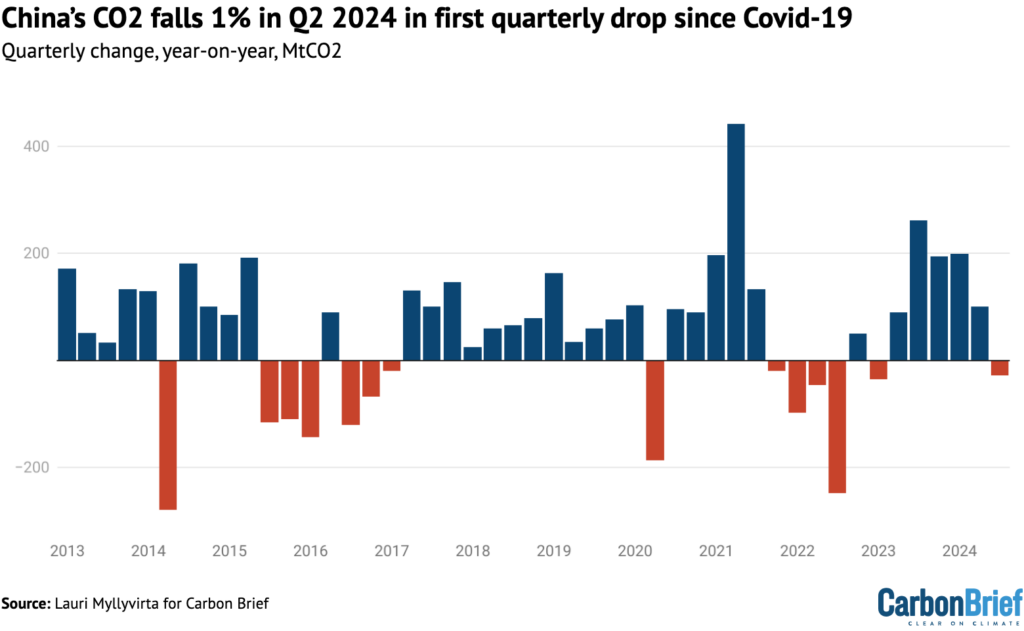
The reduction in CO2 emissions was driven by the surge in clean energy additions, which is driving fossil fuel power into reverse. (See: Clean energy additions on track to top 2023 record.)
However, rapid energy demand growth in sectors such as coal-to-chemicals diluted the impact of changes in the electricity sector. (See: Rapid energy demand growth.)
The additions of new clean power capacity in China have continued to boom this year.
China added 102 gigawatts (GW) of new solar and 26GW of wind in the first half of 2024, as shown in the figure below. Solar additions were up 31% and wind additions up 12% compared with the first half of last year, so China is on track to beat last year’s record installations.
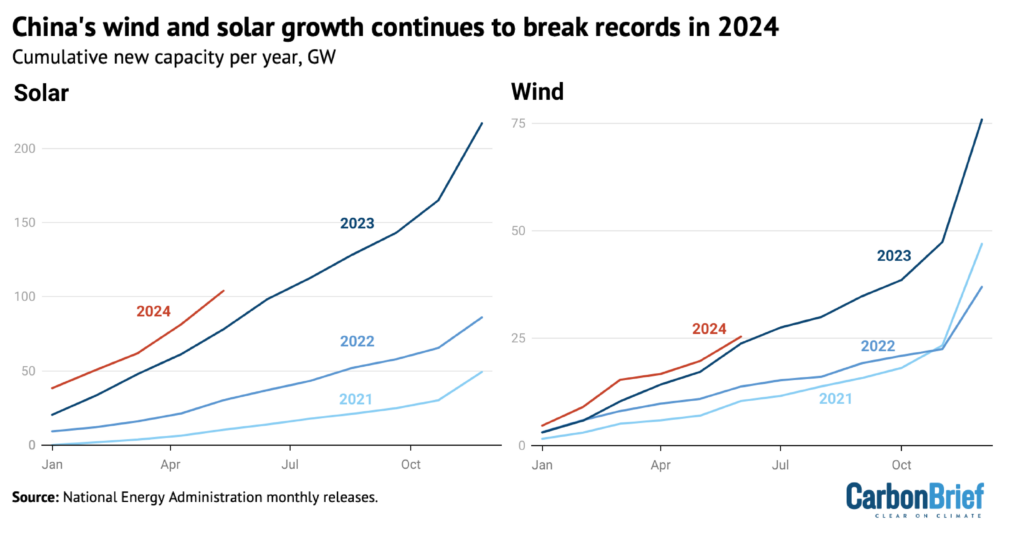
As a result of the strong capacity growth – and despite poor wind conditions – solar and wind covered 52% of electricity demand growth in the first half of 2024 and 71% since March. (The fall in wind speeds can be seen from NASA MERRA-2 data averaged for all of China.)
Indeed, the increase in power generation from solar and wind reported by the National Energy Administration in the first half of the year, at 171 terawatt hours (TWh), exceeded the UK’s total electricity supply of 160TWh in the first half of 2023.
Rapid demand growth in January–February, at 11%, had outpaced even the clean energy additions. But combined with a rebound in hydropower generation, the increase in non-fossil electricity supply exceeded power demand growth in the March to June period.
These shifts are shown in the figure below, illustrating how clean power expansion started to exceed electricity demand growth in recent months, pushing coal and gas power into reverse.
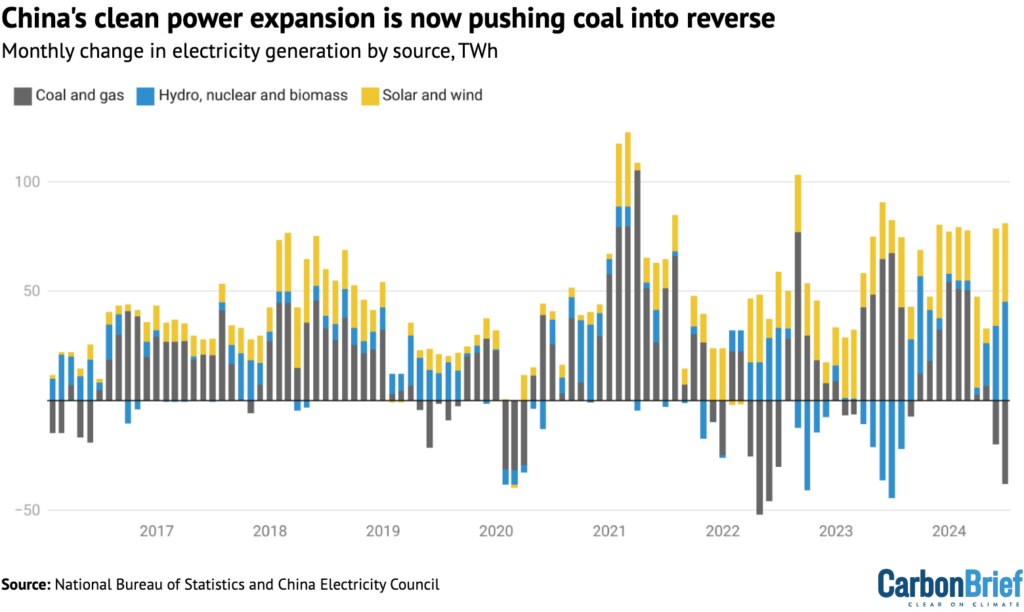
After stopping the publication of capacity utilisation data by technology in May, the National Energy Administration released data in July on power generation by technology for renewable sources – solar, wind, hydro and biomass.
The NEA’s data shows renewable electricity generation covering 35% of demand in the first half of 2024 and growing 22% year-on-year. This is much higher than the previously-published National Bureau of Statistics numbers – which under-report wind and particularly solar power generation – but is closely aligned with estimates previously published by Carbon Brief.
In terms of other clean energy technologies, the production of electric vehicles, batteries and solar cells – the so-called “new-three” due to their recently acquired economic significance – continued to grow strongly in the first half of the year, at 34%, 18% and 37%, respectively.
This growth in production indicates strong demand from China and overseas. The growth of solar cell production halted in June, however.
While clean technologies continue to surge in China, energy consumption has also continued to grow at a fast rate relative to GDP. This indicates that the energy-intensive growth pattern that China followed during zero-Covid is continuing.
In the second quarter of 2024, total energy consumption increased by 4.2%, while GDP grew by 4.7%, marking an energy intensity gain of only 0.5%. This energy demand growth is much faster than the pre-Covid trend.
China’s target is an annual improvement of 2.9%, a rate that was exceeded consistently until Covid-era economic policies shifted the country’s growth pattern. Economic growth during and after zero-Covid has been reliant on energy-intensive manufacturing industries.
The main structural drivers of recent energy consumption growth were the coal-to-chemicals industry, and industrial demand for power and gas.
The coal-to-chemicals industry produces petrochemical products from coal instead of oil, supporting China’s energy security goals but at a great cost to climate goals, as the coal-based production processes have far higher carbon footprints.
China’s energy security drive and falling coal prices relative to oil prices have driven a boom in this industry. When coal supply was tight in 2022–23, the government was controlling coal use by the chemical industry to increase supply to power plants. As the coal supply situation has eased in 2024, this has enabled coal-to-chemicals plants to increase production, with coal consumption in the chemical industry growing 21% in the first half of the year.
Gas consumption increased 8.7% in the first half of the year, with industrial and residential gas consumption rising strongly, even as power generation from gas fell. Residential demand was driven up by extreme cold in the winter, however, rather than by structural factors.
On the flipside, the demand for oil products continued to fall, with a 3% drop in the second quarter that accelerated in the summer.
There are multiple factors driving the reduction: the shift to electric vehicles is contributing to the drop, with the share of EVs in cumulative vehicle sales over the past 10 years – an indicator of the mix of vehicles on the road – reaching 11.5% in June, up from 7.7% a year ago. This means that the increase in EVs cut the demand for transport fuels by approximately 4%.
The ongoing contraction in construction volumes, which is apparent in the fall in cement production, also affects oil demand, as the construction sector is a major source of demand for oil products for freight and machinery.
Another key driver is weak demand for oil as a petrochemical feedstock, which the rapidly increasing coal-to-chemicals production attempts to displace with the use of coal, albeit at a cost of increased CO2 emissions.
The contraction in construction volumes, caused by a slowdown in real estate that began in 2021, is weighing on the demand for cement and steel. Besides the direct effect of less real estate construction, local government revenues are dragged down by a fall in land sales, affecting their ability to spend on infrastructure construction.
These changes in demand for energy can been seen in the figure below, which shows contributions to the change in China’s CO2 emissions in the second quarter of this year.
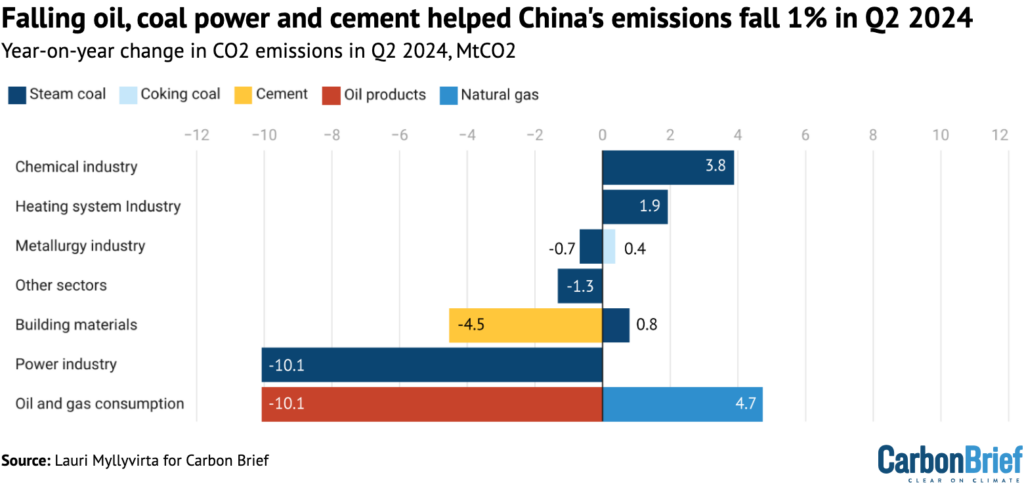
While CO2 emissions did fall in the second quarter, the rate of CO2 intensity improvements fell short of the level needed to meet China’s 2025 carbon intensity commitment.
The country’s goal is to reduce emissions relative to GDP by 18% from 2020 to 2025, with progress until 2023 falling far short of the target.
As reported GDP growth slowed to 4.7% in the second quarter, and CO2 emissions fell by 1%, CO2 intensity improved by 5.5%, short of the 7% annual improvement needed in 2024-25 to get back on track.
Improvements are also easier to achieve this year than they will be in 2025, as the rebound of hydropower from the low availability in 2022–23 helps reduce emissions. This is a one-off tailwind that is not likely to be present in 2025.
One part of the energy-intensive industry that China has been relying on to drive economic growth is the manufacturing of clean energy technologies. In response, some commentators have exaggerated the CO2 impact of Chinese factories making solar panels, EVs and batteries.
In reality, however, the manufacturing of these goods was responsible for 1.6% of China’s electricity consumption and 2.9% of its emissions in the first half of 2024, based on calculations using publicly available data.
The same calculations show that their CO2 emissions and electricity consumption increased by approximately 27% in the same period, contributing a 0.6% increase in China’s total fossil CO2 emissions and 0.4% increase in electricity consumption.
Looking ahead to the rest of this year, energy consumption growth is expected to cool. The China Electricity Council projects electricity demand growth of 5% in the second half of the year, compared with 8.1% in the first half, and the National Energy Administration expects full-year gas demand growth to moderate to 6.5–7.7%, from 8.7% in the first half.
If these projections are accurate, then the continued growth of clean energy consumption would be sufficient to push China’s CO2 emissions into decline this year.
However, the faster-than-expected energy demand growth in the first half of the year dilutes the emission reductions from the country’s record clean energy additions, and adds uncertainty to whether China’s emissions will indeed fall in 2024 compared with 2023.
If the growth rates of energy demand, by fuel and sector, seen in the second quarter of this year continue into the third and fourth quarter, with similar continuity in the growth rates of non-fossil electricity generation, then China’s emissions would stay flat in 2024 overall.
Energy consumption growth could also be moderated by a renewed policy focus on energy and climate targets. In May of this year, the State Council, China’s top administrative body, issued an action plan on energy conservation and CO2 emission reductions in 2024–25.
This plan is notable both for the unusual time period, covering the last two years of the five-year plan period, and for its high-level nature – energy conservation would normally fall under the jurisdiction of the energy and environmental regulators, rather than the State Council.
This suggests that the government recognises the shortfall against the 2025 carbon intensity and energy intensity targets. The action plan calls for meeting both of these targets, and lists numerous measures to be undertaken in response.
Yet the plan did not set numerical targets for 2024 that would be consistent with meeting the 2025 targets, which could be seen as taking a hedged approach of pushing for more action but not guaranteeing that sufficient results will be achieved.
Another State Council plan, released in late July, calls for speeding up the creation of a “dual control system” to control total CO2 emissions and emissions intensity. (Historically, China has never set numerical targets for total CO2 emissions, only aiming to limit CO2 intensity.)
According to the July release, the 15th five-year plan will set a binding carbon intensity target in the 2026-30 period, in line with previous five-year plans. For the first time, there will also be a non-binding, “supplementary” target for China’s absolute emissions level in 2030. Then, for each of the following five-year periods, there will be a binding absolute emissions target.
After the shortfall against the 2025 intensity target, the 15th five-year plan period would need to set a demanding intensity target to fulfil China’s 2030 commitments under the Paris Agreement.
The most important political meeting of the year, the “third plenum” of the Central Committee of the Communist Party, took place in July. The readout of the meeting mentioned carbon emissions reduction for the first time, but did not signal a shift to stimulating consumption. This could have driven less emissions-intensive economic growth, reducing reliance on higher-carbon manufacturing or infrastructure expansion.
The key focus of the meeting was promoting “new quality productive forces”, meaning advanced manufacturing and innovation. In practice, this likely implies a continued emphasis on manufacturing, with the potential for the energy-intensive economic growth pattern to continue.
Another indication that carbon emissions are receiving more policy emphasis is that the government appears to have stopped permitting new coal-based steelmaking projects since the beginning of 2024.
Hundreds of coal-based “replacement” projects were permitted in previous years, preparing to replace up to 40% of China’s existing steelmaking capacity with brand-new furnaces.
The shift away from new coal-based capacity is consistent with China’s target of increasing the use of electric arc furnaces – but progress towards that target had been lagging.
On coal-fired power, the government issued a new policy on “low-carbon transformation” of coal plants, aiming to initiate “low-carbon” retrofitting projects of a batch of coal power plants in 2025, with the target of reducing the CO2 emissions of those plants 20% below the average for similar plants in 2023, and another batch in 2027 aiming for emission levels 50% below 2023 average.
Under this transformation plan, emissions reductions at targeted coal plants are supposed to be achieved by “co-firing” coal with either biomass or “green” ammonia derived from renewables-based hydrogen, or by adding carbon capture, utilisation and storage (CCUS).
However, there are no targets for how many coal plants should be retrofitted, or what the incentives will be to do that, which will obviously determine the direct impact of this policy.
The impact could be small as biomass supply is limited, while the costs of ammonia and CCUS are high. For example, the International Energy Agency – among the more optimistic on power generation from biomass – sees its share rising from 2% in 2022 to 4.5% in 2035, if China meets its pledges on energy and climate IEA’s.
Furthermore, much of China’s coal-fired generation is already unprofitable, with almost half of the firms in the sector operating at a loss – even before taking on costly new measures.
The policy does however constitute Beijing’s first attempt at reconciling the recent permitting spree of new coal-fired power plants with its CO2 peaking goal for 2030, and looking for alternatives to early closure or under-utilisation of at least a part of the coal power fleet.
China’s emissions fell year-on-year in March and in the second quarter, as expected in my analysis for Carbon Brief last year.
Faster-than-expected growth in coal demand for the chemical industry, however, as well as industrial demand for power and gas, has diluted the emission reductions from the power sector, making the fall in emissions smaller than expected.
Nevertheless, China is likely still on track to begin a structural decline in emissions in 2024, making 2023 the peak year for CO2 emissions.
In order for this projection to bear out in reality, clean energy growth would need to continue and the expected cooling in energy demand growth in the second half of the year would need to materialise, with the new policy focus on energy savings and carbon emissions proving lasting.
The trends that could upset this projection include the economic policy focus on manufacturing, and the expansion of the coal-to-chemicals industry.
The surge in coal use for coal-to-chemicals is also a demonstration that even if power sector emissions begin to fall, as long as China’s climate commitments allow emissions to increase, there is the potential for developments that increase emissions in other sectors.
China has committed to updating its climate targets for 2030 and releasing new targets for 2035 early next year. These targets will be key in cementing the emissions peak and specifying the targeted rate of emission reductions after the peak – both of which have seismic implications for the global emissions trajectory and the level at which temperatures can be stabilised.
Data for the analysis was compiled from the National Bureau of Statistics of China, National Energy Administration of China, China Electricity Council and China Customs official data releases, and from WIND Information, an industry data provider.
Wind and solar output, and thermal power breakdown by fuel, was calculated by multiplying power generating capacity at the end of each month by monthly utilisation, using data reported by China Electricity Council through Wind Financial Terminal.
Total generation from thermal power and generation from hydropower and nuclear power was taken from National Bureau of Statistics monthly releases.
Monthly utilisation data was not available for biomass, so the annual average of 52% for 2023 was applied. Power sector coal consumption was estimated based on power generation from coal and the average heat rate of coal-fired power plants during each month, to avoid the issue with official coal consumption numbers affecting recent data.
When data was available from multiple sources, different sources were cross-referenced and official sources used when possible, adjusting total consumption to match the consumption growth and changes in the energy mix reported by the National Bureau of Statistics for the first quarter and the first half of the year. The effect of the adjustments is less than 1% for all energy sources, and the conclusion that emissions fell in the second quarter holds both with and without this adjustment.
CO2 emissions estimates are based on National Bureau of Statistics default calorific values of fuels and emissions factors from China’s latest national greenhouse gas emissions inventory, for the year 2018. Cement CO2 emissions factor is based on annual estimates up to 2023.
For oil consumption, apparent consumption is calculated from refinery throughput, with net exports of oil products subtracted.
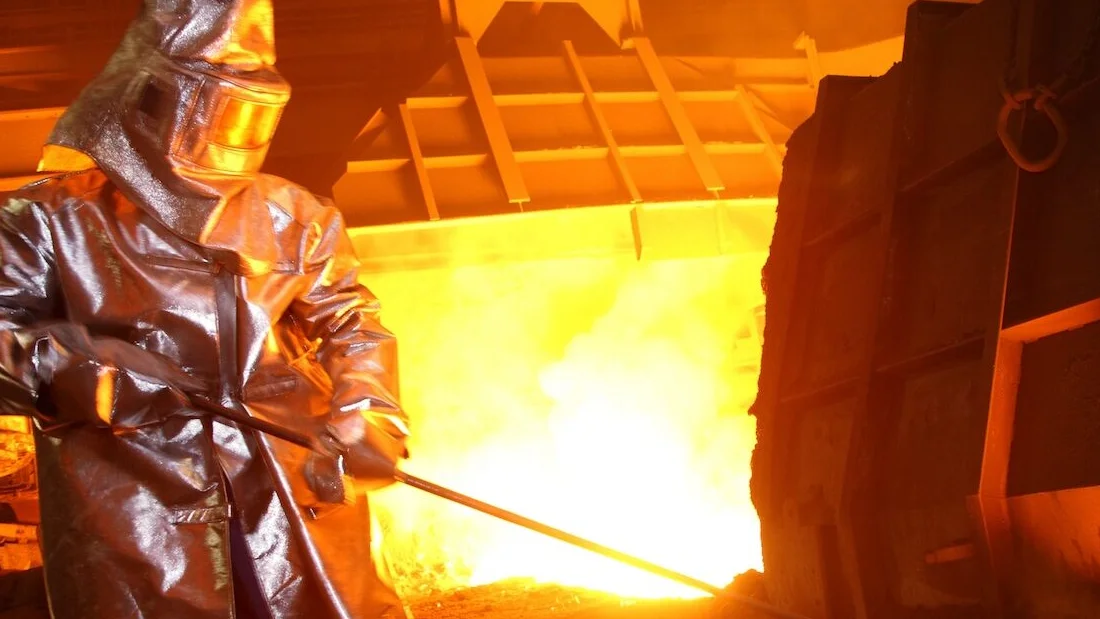
The bulk of steelmaking around the world still relies on coal-based blast furnaces.
As a result, the steel and iron industry is responsible for 7% of greenhouse gas emissions and 11% of carbon dioxide emissions globally, according to the consultancy firm Global Efficiency Intelligence.
This is more than the total emissions from all the world’s cars and vans.
With steel critical to the building out of decarbonised energy infrastructure, production is expected to continue to rise over the coming years, meaning the potential for decarbonisation is “enormous”, according to not-for-profit data organisation Global Energy Monitor (GEM).
GEM’s annual “Pedal to the Metal” report reveals that 93% of new steelmaking capacity announced thus far in 2024 promises to use lower emission electric arc furnaces (EAFs).
It also shows that 49% of the world’s steelmaking capacity under development now uses EAFs, up from just 43% in 2023 and 33% in 2022.
Of this, nearly all of the capacity announced since the beginning of 2024 operates using EAFs, the non-governmental organisation’s Global Steel Plant Tracker (GSPT) shows.
The tracker covers 2,207m tonnes per year (mtpa) of operating steelmaking capacity and an additional 774mtpa of steelmaking capacity under development globally, across 1,163 individual plants in 89 different countries, analysis of which is captured in its annual report.
However, while the report suggests a positive progression towards lower emission technologies in the sector, the increase in the announced projects is not yet leading to a construction of EAF overtaking coal-based production methods.
Coal-based blast furnace-basic oxygen furnaces (BF-BOFs) – where blast furnaces are used to produce iron from ore and oxygen converters then turn this, with some additional elements, into steel – continue to dominate the projects under construction, meaning “pressure must be maintained all the way through to project completion if real progress is to be seen”, the report finds.
Incoming steelmaking capacity is more heavily EAF-based than ever before, according to GEM’s new report.
There is currently 774mtpa of steelmaking capacity under development, of which 223mtpa is in the advanced development stage.
Based on data from April 2024, the GSPT shows that nearly half of the capacity under development (337mtpa) is EAFs.
Just 36% of steelmaking capacity announced in 2020 with a known production route used EAFs, while in 2023 that number had increased to 92% according to GEM. This grows to 93% of capacity when looking at steelmaking capacity under development announced in 2024.
This “indicates a significant shift toward electric arc furnace steelmaking in the years to come”, the report notes.
Meanwhile, of the 212mtpa of steelmaking capacity slated for retirement, 88% if BOF-based.
However, a net increase in BOF-based capacity is expected over the coming years. If all planned developments and retirements take effect, an additional 171mptpa of BOFs is expected to be added to the global fleet, along with 310mtpa of EAF and 80mtpa of unknown technologies.
Despite this growth in BOFs, the surge of EAF means the steel sector is getting increasingly close to meeting the International Energy Agency’s (IEA) suggested 2030 target.
In its net-zero by 2050 roadmap, the IEA suggests that the share of steel produced by EAF should grow from 24% in 2020, to 37% by 2030 and then 52% by 2050.
Considering all planned capacity and retirements, GEM now estimates that the global steel fleet is expected to reach 36% EAF by 2030, noting: “This is still not sufficient to meet the IEA [net-zero] climate target, but with heightened momentum the goal is increasingly attainable.”
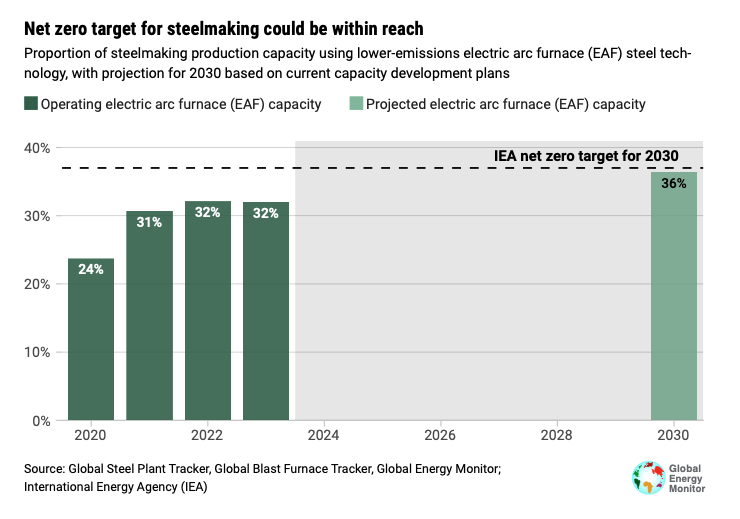
While EAF-steelmaking is being announced at “record rate”, GEM finds that less than 14% of this potential capacity has moved into construction.
Of those that have moved into construction, around 46% are still BOF-based. As such, “while we may be within reach of net-zero targets based on proposed electric arc furnace capacity, actually achieving these goals requires follow-through”, the report notes.
Caitlin Swalec, program director for heavy industry at GEM, said in a statement:
“The progress is promising for a green steel transition. Never before has this much lower-emissions steelmaking been in the pipeline. At the same time, the buildout of coal-based capacity is concerning. What the industry needs now is to make these clean development plans a reality, while backing away from coal-based developments.”
As well as the buildout of new coal-based capacity being out of alignment with a net-zero future, it poses a threat of carbon lock-in and stranded assets, GEM notes.
Blast furnaces are becoming riskier investments given the limited options to mitigate emissions from both the furnaces themselves and the upstream emissions from the metallurgical coal mining, it adds.
Estimating an investment of $1-1.5bn per mtpa capacity at an integrated BF-BOF site, GEM found that the future stranded-asset risk could be as high as $554bn in 2023, falling to $400bn in 2024 due to the continued fall in BOF capacity under development.
Astrid Grigsby-Schulte, project manager for steel at GEM tells Carbon Brief:
“As we grow closer to key decarbonisation milestones, coal-based developments get further out of alignment with the direction the industry is moving and present a greater risk of stranded assets to steelmakers. Coal-based, emissions-intensive blast furnaces represent significant investments that often require decades to recoup. This makes them extremely risky for developers, particularly in countries with stated net zero commitments.”

The limited options for mitigating the climate impact of BOF-steelmaking was also highlighted within a recent report from the thinktank Sandbag.
While carbon capture, utilisation and storage (CCUS) is often touted as a “catch all” solution, its effectiveness varies widely across applications, Sandbag’s “Steel & CCS/U” report finds.
For steel production, BF-BOFs with carbon capture are unlikely to be cost-competitive with EAFs, the report finds. Although given the slow pace of technological and market development, Sandbag anticipates capturing carbon will play a limited role in the steel industry.
India has now replaced China as the top steel developer globally, with a pipeline of 258mtpa of capacity, of which 177mtpa is BOFs, according to GEM.
China has a pipeline of 150mtpa meaning, collectively, China and India are responsible for 53% of all developments globally.
Asia operates 68% of all steelmaking capacity (1,508mtpa), the majority of which is in China (1,075mtpa), India (123mtpa) and Japan (109mtpa).
When looking specifically at emissions-intensive BOF production, Asia’s share of total operating capacity increases to 80% (1,181mtpa), of which 918mtpa is in China.
Currently, China has 157mtpa of operating EAFs (22% of the global capacity), followed by the US, Turkey, Iran and then India.
According to a new report from the Centre for Research on Energy and Clean Air (CREA), China did not issue any new permits for coal-based steelmaking in the first half of 2024. This is the first time this has happened since the nation’s “dual carbon goals” were announced in September 2020.
During the first six months of 2024, Chinese provincial governments permitted 7.1mtpa of steelmaking capacity, all of which were EAFs marking a “turning point” for the country’s steel industry, CREA notes.
Xinyi Shen, researcher at CREA and the report’s lead author, tells Carbon Brief: :
“China’s EAF steelmaking has been developing rather slowly in the past few decades, mainly due to the constraint of scrap supply. However, as China’s steel demand reaches its peak and more scrap becomes available, a major opportunity arises to reduce emissions in the next 10 years. The government has accelerated plans to expand the national ETS to include the steel sector by the second half of 2024. By implementing carbon pricing on carbon-intensive products, EAF steelmaking would become more economically competitive and continue the growth.”
Despite India now overtaking China in terms of announced steelmaking capacity, China remains the biggest developer of EAF capacity overall, GEM’s report states. And while India has the most steel in development, 84% has not moved into construction.
As such, there is still an opportunity for India’s plans to change, with the percentage of BOFs to EAFs less set.
Chris Bataille, adjunct research fellow at the Columbia University Center on Global Energy Policy and lead author at the global Net Zero Steel project tells Carbon Brief:
“India’s core demand for steel is set to increase from 125mtpa to ~450mtpa by 2050, especially to meet key building and infrastructure needs. Our modelling suggests EAFs consistently rise from ~35 to 150mtpa by 2050. So the +250mtpa BF-BOFs is just barely feasible, but only over ~25 years and with some exports of BF-BOF steel.
“The difference will be between a world where strong climate policy succeeds and fails. If it fails and coal based BF-BOFs are built, then the +258mtpa looks barely feasible. If it succeeds, India is short on the necessary gas and especially clean electricity to power this amount of steel production. While the country does build a lot of EAFs, it builds up to 250mtpa of clean iron making over time, making the short term shortfall with clean HBI iron imports.”
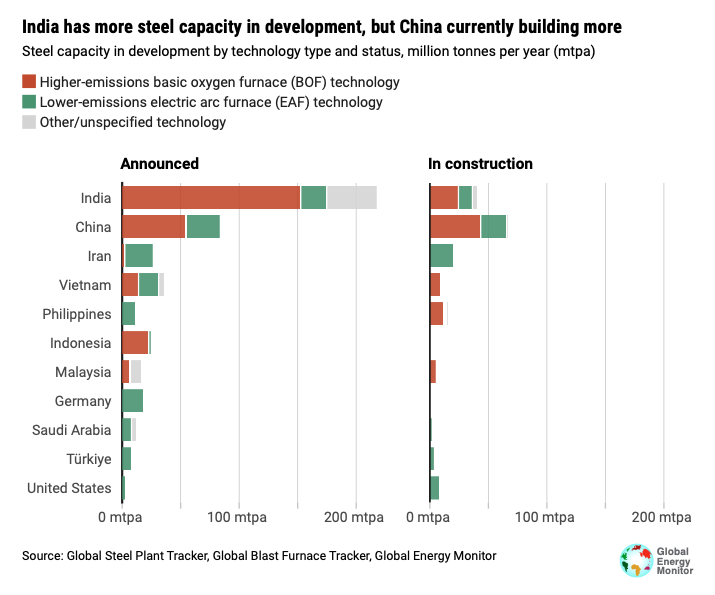
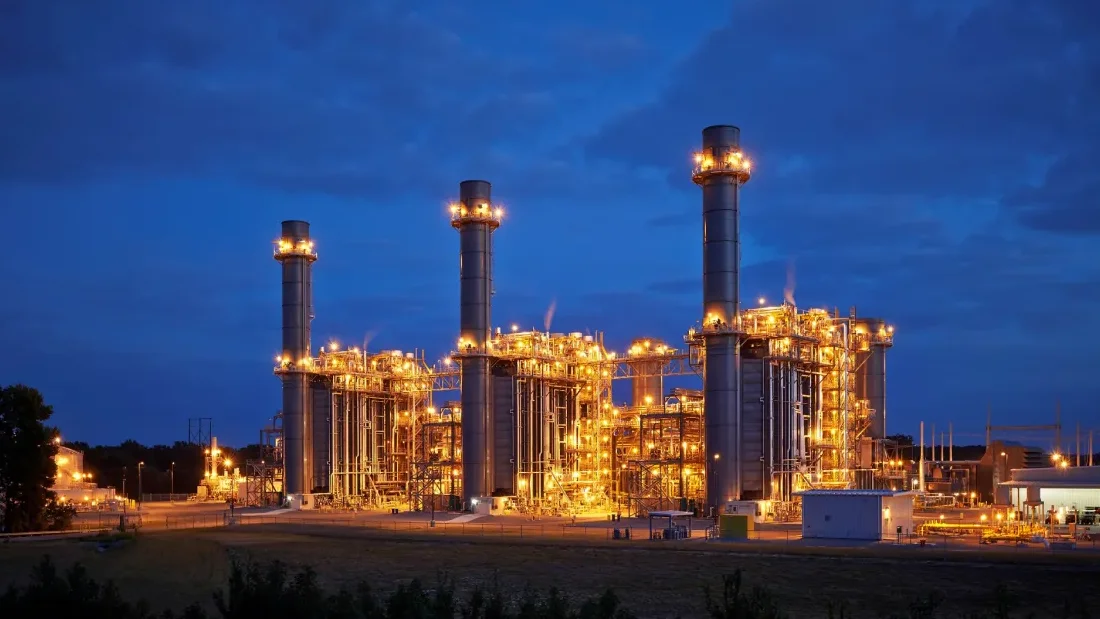
UTILITIES: As Duke Energy prepares to face North Carolina regulators and defend its plan to invest in 9 GW of natural gas plants and delay meeting an emissions reduction mandate, it makes small concessions in a proposed settlement and wins support from the state’s ratepayer advocate. (Energy News Network)
ALSO:
COAL ASH: Environmental groups press the U.S. EPA to take control of Georgia’s coal ash program from state regulators because they’ve allowed utilities to keep unlined coal ash ponds where the waste is in contact with groundwater. (Atlanta Journal-Constitution, Georgia Recorder)
SOLAR: Texas saw a spike in the number of homes adding small-scale solar facilities even before Hurricane Beryl, which caused widespread outages that could encourage more state residents to add solar installations. (Inside Climate News)
GRID:
CLIMATE:
OVERSIGHT: Louisiana and Mississippi commissions sue federal regulators over an order that sets requirements for long-term electric grid planning, one of the first challenges to a federal agency since the U.S. Supreme Court opened up ambiguous agency decisions to legal challenges. (E&E News)
EMISSIONS: The U.S. EPA will evaluate air quality at two national parks in Texas as part of a settlement in a lawsuit by environmentalists. (Marfa Public Radio)
STORAGE: An energy company closes on financing for three standalone utility-scale battery energy storage projects in Texas that will be built near solar farms. (Utility Dive)
POLITICS: An official from Kentucky’s attorney general disputes the science behind climate change in testimony to state lawmakers, arguing against U.S. EPA rules that require coal- and new natural gas-burning power plants to capture 90% of carbon emissions. (Kentucky Lantern)
COMMENTARY: West Virginia should embrace wind, solar and electric vehicle industries to add clean energy-related jobs and attract new residents, writes a conservationist. (State Journal)